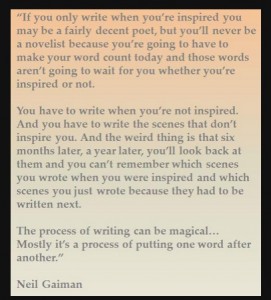 A piece of writing advice I often see tossed out there is that you must love your own characters, if you want your readers to love them. A parallel bit of advice is that a writer must be interested in the scene she writes in order to create interest in the reader. Every time I see this sort of thing, I pause and ask myself if I think that’s true.
A piece of writing advice I often see tossed out there is that you must love your own characters, if you want your readers to love them. A parallel bit of advice is that a writer must be interested in the scene she writes in order to create interest in the reader. Every time I see this sort of thing, I pause and ask myself if I think that’s true.
I’ve decided that I really don’t.
I think this is a kind of false logic that springs from observations on the relationship between art, artist and viewer that I talked about a few days ago while discussing how to write vivid characters. Basically it’s the idea that our conscious understanding of what we’re trying to show as artists subconsciously affects the viewer (or reader, play-watcher, etc.). I observed long ago in directing a play that where I was muddy in how I understood the story, so was the audience. I do think this is a real phenomenon.
What’s not so real is the conflation that our emotional reaction to the work – love, fascination, what-have-you – will also manifest in the final product.
 I’m not sure why it doesn’t work this way, but from my own experience, and from what other writers have said, it simply doesn’t. Neil Gaiman has written about this before and I can’t find the direct quote right now (updating to say I ran across it – posted in pic), but particularly for novel writing, there are long slogs where the writer might be bored out of his mind. Neil suggests that a writer who wants to feel constantly engaged by her own work might make a good poet, because poems are short enough. A novelist, however, he points out, has to have more endurance. It takes a long time to write a novel. I’ve calculated that I can write steadily at an average of 1,700 words per day, including days off and intervening edit rounds on other works. This means it takes me approximately 70 days to write a 120K word novel. That’s pretty fast, I’m reliably informed. It also works out to about 3 months writing the story.
I’m not sure why it doesn’t work this way, but from my own experience, and from what other writers have said, it simply doesn’t. Neil Gaiman has written about this before and I can’t find the direct quote right now (updating to say I ran across it – posted in pic), but particularly for novel writing, there are long slogs where the writer might be bored out of his mind. Neil suggests that a writer who wants to feel constantly engaged by her own work might make a good poet, because poems are short enough. A novelist, however, he points out, has to have more endurance. It takes a long time to write a novel. I’ve calculated that I can write steadily at an average of 1,700 words per day, including days off and intervening edit rounds on other works. This means it takes me approximately 70 days to write a 120K word novel. That’s pretty fast, I’m reliably informed. It also works out to about 3 months writing the story.
Am I always entranced by every scene I write? No.
Will I experience every emotion I write? Not at all.
Do I always love my characters? Not by a long shot.
Now, some days I do! Sure, sometimes I cry while writing, or feel in love with my characters. Other times it’s like laying down bricks on an endless road. This is why what Neil said resonates with me. He noted this same thing, that there can be long periods where the writing feels dreadfully dull and not at all engaging, and – most salient – that when he goes back and reads the final work, he can’t discern which parts he wrote while loving it and which while slogging through.
I have experienced exactly this thing.
So, no – you don’t have to love your own characters. Just as, I might be going out on a limb here, we don’t always feel gushing love for our spouses every minute of every day. But what we do have is commitment to them. In a long-term relationship, we stay the course and feed the parts we want to grow. Writing a novel requires the same commitment. Don’t expect to love every moment, every nuance. Stay the course, feed the work and trust in yourself as an artist.
Do the work and the love will follow
Great post. Sometimes not loving a character can mean you write better scenes for him/her. Look at Severus Snape: his death is the only well written death because Rowlings didn’t love him. All the other deaths are confusing or glossed over because she cared about them too much.
That’s so interesting, Carien – I did not know that about JK Rowling! But I can see that happening for an author, for sure.